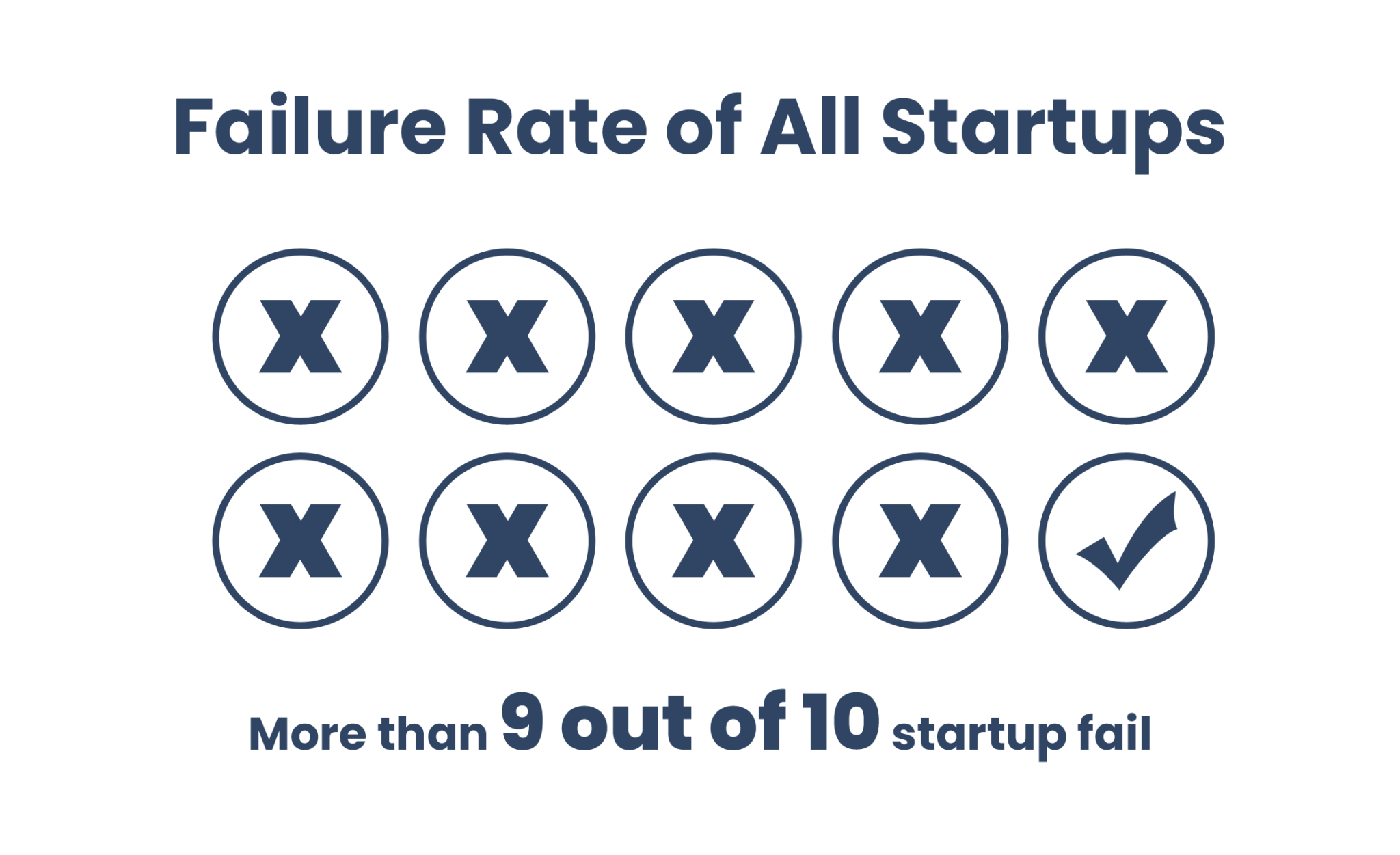Startup project management is critical. Why? Every day is different in the startup sector. Despite this, many business owners fail to see the need for effective project management for their budding businesses. But it is true that when project management is done well, there is no chance of making a mistake. With so much to accomplish and so many hands in the pot, there is a lot of pressure on everyone involved. Startups have a team-first ethos, which means that everyone on the team is eager to pitch in and help get the work done. Even though the horizontal leadership structure may help build a sense of community, the day-to-day tasks and responsibilities of owning and finishing a project can get confusing and messy.
When nine out of ten businesses fail, and every minute and dollar spent in the beginning is important, wasting time may be expensive. To reduce the chance of failure and achieve that elusive startup success, it is necessary to have the appropriate tools in place. And these may include project management software that keeps the whole team focused and on target.

Startup project management: why is it critical?
Startup project management can be difficult, but no business owner can overlook it. In fact, every business, no matter how big or small, needs to be able to manage projects well. However, startup project management and efficiency may not be at the top of your priority list when you’re just starting. However, as your business expands, these considerations should rise to the top of your priority list. These aspects of a business are critical to the accomplishment of a project and the execution of a business strategy successfully.
A structured approach to startup project management may appear pointless, restrictive, and unnecessarily demanding in today’s fast-paced, entrepreneurial startup environment. However, establishing project management practices and using a software product at the outset can help your company survive as it grows. Method and structure for the project can coexist with flexibility for changes in them, and a software application for project management may help with both.
Startup Project Management Tips for Entrepreneurs
1. Set attainable startup project management goals
Entrepreneurs must not “just” have objectives; they must also be worthwhile objectives. Setting and attaining realistic objectives will provide you with contentment and well-being. Start by making a solid base for establishing goals.
-
- Recognize your clients.
-
- Make a solid plan for the project.
-
- Possess a can-do attitude and an adventurous spirit.

Think about the following:
-
- What is my long-term goal’s most basic purpose?
-
- Evaluating the feasibility of the long-term goal.
-
- How to build on what you’ve done?
Regardless of where you want the startup to be, you should set goals that you can achieve and, more importantly, that the startup is required to achieve.
2. Turn failures into success
A business owner’s life is what they create from the beginning. The ups and downs of being an entrepreneur are something that most of you probably aren’t aware of. But you’ve probably heard about the “flowery life” of being an entrepreneur.
The smooth running of the project will be made difficult by complaints from stakeholders, heated discussions within the team, missed deadlines, and challenges with the project’s financial resources. Therefore, it is up to you to choose how you will react to the obstacle and transform it into an opportunity for business development. What do you think about the failures you encounter?
3. Start with yourself (self-evaluation).
On your way to becoming an entrepreneur, you’ll need to stop and think about where you are and where you want to go. So, what motivates you to start your own company? As a source of additional income? For a greater sense of liberty? For passion? Is that what you want? Find out the answer for yourself. Prepare yourself for a follow-up question like:
-
- Do you have any special skills or talents?
-
- Are you a person who takes responsibility?
-
- What excites you the most about life?
-
- Have you got enough energy to work on the weekends?
-
- How much money do you have?
-
- Are you clear on what you need to do?
-
- Which lifestyle do you plan to pursue in the future?
-
- Are you ready to be your own boss?
4. Preparing for Milestones
A milestone may signify a shift in development. It can help you let people know what is going on with your project. One of the most important parts of your project plan is showing you how you work on your project. Establish the ideal benchmarks for your team to reach. Discuss the significance of each milestone with your team to keep everyone on track toward the desired outcomes. From the start of your startup’s project management, there are also things you can do to make sure that all of your goals and objectives are met.
-
- Find and eliminate project risks.
-
- Set progress reporting
-
- Use calendars to keep track of important dates.
-
- Keeping tabs on the progress of a project’s deliverables is essential.
-
- Think about the support of your stakeholders.
-
- Prepare yourself for the long haul.
It’s important to start increasing the ambition of your milestones over time so that your initiatives would always be a success.
5. Talk to your team regularly
To successfully communicate with the relevant people, you will need to understand the communication process. When it comes to startup project management, better communication means everyone understands the importance of good project management. Every day of communication within the team helps maintain the requirements under control. As the project progresses, you’ll be able to keep your team up to date on everything.
Communication is more than simply a two-way exchange of ideas; it requires an awareness of the project’s ins and outs. You need to be available to everyone, know what problems the project will face, get everyone involved, and be able to explain your vision clearly.

6. Set a budget, and a deadline
Have you given any thought to the significance of the three constraints for startup project management? This is an essential aspect of the project since it monitors the administration of the startup project. Time allocations are of the essence if you want to launch your product or project on time successfully. Therefore, you must have a system that allows you to estimate the length of time required to complete each job. You can easily compare the amount of time spent on a work or project using free Gantt chart software that includes project management capabilities.
Defining a project’s scope is important for managing it. It is necessary to make a decision on the scope of the product or project. It provides an explanation of the predetermined criteria that must be met in order to finish the project on time and without exceeding the specified budget.
Cost budgeting establishes a foundation for future costs. Money is the reason many businesses fail. Therefore, you must organize your resources to avoid running out of money. Using project management software, you may acquire an understanding about an accurate estimate of your budget by assessing the variations in costs.
7. Set Up a Team That Isn’t Going to Sink Your Company
Research on why startups fail shows that having the wrong team is one of the top reasons. Entrepreneurship is not a lonely endeavor. You can not do it alone. CBInsights says that 23% of businesses fail because they don’t have a strong staff with the right skills.
Here’s how to find a great team for your new business:
-
- Look for experience that matters.
-
- Create a shared understanding of the values and norms that guide your team’s conduct.
-
- Make sure they are all going the same way.
-
- Explain to them the importance of providing excellent customer service.
-
- Convince them of the value of what you are trying to do.
8. Startup project management tools
There are many high-level bucket features in project management tools. Some examples of what you can do with a tool are:
-
- Keeping track of what has to be done
-
- Planning
-
- Keeping track of documents and files
-
- Managing inventory
-
- Organizing resources
-
- File-sharing
-
- Reporting bugs
-
- Budgeting and sending bills

These online project management tools can help you stay organized as you embark on your company adventure. You can also compare project management tools and their detailed features to find the best fit for your organization. Here’s a list of startup project management tools to consider:
-
- ProofHub
-
- Droptask
-
- Hitask
-
- nTask
Wrapping up
Remember that project management at your company doesn’t have to be unnecessarily complicated and demanding. The right tool will also help you in many ways, including:
-
- Make the most of your limited resources.
-
- Keep your customers and the team happy.
-
- Offer you the necessary skills and procedures to bring projects through to success.
This is how we’ve grown over the years and became an award-winning software engineering company.

